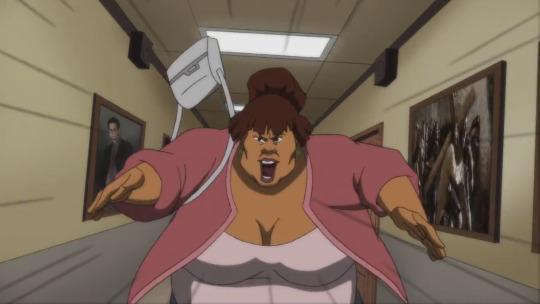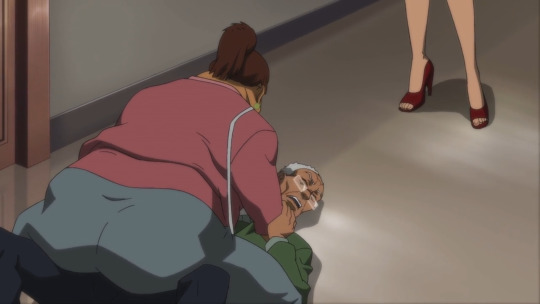#transmisognyoir in media
Text
One of the things I'm hoping to get across in this Boondocks video™ in progress is the way a lot of discussions about adult animation center less around genuinely engaging with the commentary these shows often make and more rationalizing and elevating blatant bigotries as an elaborate progressive satire.

I don't hate the Boondocks. In a lot of ways it's fantastic, but I also find that a lot of more left-leaning adult animated series like Bojack Horseman, Tuca and Bertie, Bob's Burgers and The Boondocks get placed in this deified space where they're placed in binary terms against the likes of the shows agreed upon to be the "bad" ones like South Park, Family Guy, etc.
It's especially valuable to be more critical about these as discussion pieces as they're often very impressionable and influential on younger viewers in their mid to late teens and early 20s.
Because it's not Family Guy, it must be progressive and how dare you ever speak critically of it in any capacity.
So much discourse around queer themes in The Boondocks only center around The Story of Gangstalicious Part 2 without looking at several other relevant episodes and themes throughout the show, which I think gives a very incomplete picture of the nature of the kind of commentary The Boondocks makes.
In particular, I think it does a major disservice to Black trans people and the way that misogynoir also influences the discussions of queerness in The Boondocks.
But it can also be difficult to have this conversation because of the ways that "it's a satire, they're intentionally awful people" is utilized.
Depiction is not endorsement, but just because a work is satirical or your cast are intentionally bad people doesn't mean you're magically free of the narrative implications behind how you frame your cast.
Depiction is one piece of the puzzle, but you can't discuss it without discussing framing.
In some way, shape, or form, these conversations often assert that criticisms of these works are unfounded because the use or inclusion of bigoted characters doesn't make the work itself bigoted, which...isn't the claim being made.
For example, Robert Freeman throughout much of the TV series is depicted as a blatant womanizer and is repeatedly mocked for that attitude. The entire episode Pause AKA the Tyler Perry episode is in part a long joke at his expense for his womanizing behavior and for overestimating his skills as an actor.
This idea isn't wrong, but it is incomplete. While you can certainly make that argument the episode is a joke at a womanizer's expense, it still doesn't grapple with how the narrative delivers his comeuppance within the confines of cisheteronormative ideas about queer and fat bodies.


You can only see Robert as being "punished" if you also agree with the framing that fat women's bodies are disgusting and worthless, thus they are thrust onto him as comeuppance for his sleazy behavior toward "actual" (i.e. conventionally attractive) women.
You can only see Robert as "getting what's coming to him" if you cosign the way that the episode frames and links the element of queerness or being publicly perceived as queer as gross and awful, with Robert even comparing the concept to the gross challenges done in Fear Factor.
Likewise, Pause runs into a lot of issues very quickly in how it depicts Winston Jerome, the Tyler Perry stand-in as a predatory gay man with the desire to be a woman "both inside and out" in his words. A Tyler Perry who deceives Robert with the promise of sexual gratification with beautiful women only to see he's being preying on Robert to trick him into having sex with a gay man.
It's not helped by the title of the episode being "Pause" and the episode also heavily referencing The Rocky Picture Horror Show.
A lot of Pause and several other episodes in the Boondocks lean into very homophobic and transphobic notions of fat and queer bodies and the idea of viewing Black queer people as predatory beasts.
This is also my issue with a lot of discussions about adult animation in how they center around if individual people are "meant" to be seen as bad.
To leave the episode as "Robert is a womanizer we're not meant to agree with" is to leave out the entire discussion of the portrayal and utilization of queerness and misogynoir within the Boondocks.
This also applies to discussions of Riley's homophobic beliefs within the series. Riley espousing homophobic views is not an endorsement of homophobia by the series proper nor the creators. He's designed to be a very specific form of critique about the bigoted attitudes normalized in the hip hop community as well as a commentary on the narratives normalized through Black media.
But leaving the conversation there without making further discussion on how the Boondocks frames those issues within its own storytelling oversimplifies the conversation and invalidates the very real grievances Black queer people have felt toward portrayals and narratives like this.
The video will discuss this in more depth than my light summary here since this is a preview of sorts and go into the historical precedent for these ideas, so this is just a taste of what's to come.
I'm almost through the research phase with only a few more books to read through and watching a few other series and films that the Boondocks is heavily inspired by, so I'm looking forward to rewatching the Cowboy Bebop movie this weekend!
#boondocks criticism#black media#black media analysis#black queer#black lgbt#black lgbtq#adult animation#cw: transphobia#transmisognyoir in media#misogynoir in media#fatphobia in media#black animation#the boondocks#black women in media
4 notes
·
View notes